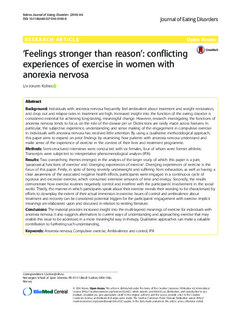| dc.contributor.author | Kolnes, Liv-Jorunn | |
| dc.date.accessioned | 2016-06-07T11:04:20Z | |
| dc.date.available | 2016-06-07T11:04:20Z | |
| dc.date.issued | 2016-03-09 | |
| dc.identifier.citation | Journal of Eating Disorders. 2016, 4, 6 | nb_NO |
| dc.identifier.uri | http://hdl.handle.net/11250/2391691 | |
| dc.description | Open Access. This article is distributed under the terms of the Creative Commons Attribution 4.0 International License (http://creativecommons.org/licenses/by/4.0/), which permits unrestricted use, distribution, and reproduction in any medium, provided you give appropriate credit to the original author(s) and the source, provide a link to the Creative Commons license, and indicate if changes were made. The Creative Commons Public Domain Dedication waiver (http://creativecommons.org/publicdomain/zero/1.0/) applies to the data made available in this article, unless otherwise stated. | nb_NO |
| dc.description.abstract | Background
Individuals with anorexia nervosa frequently feel ambivalent about treatment and weight restoration, and drop out and relapse rates in treatment are high. Increased insight into the function of the eating disorder is considered essential for achieving long-lasting, meaningful change. However, research investigating the functions of anorexia nervosa tends to focus on the role of the disease per se. Distinctions are rarely made across features. In particular, the subjective experience, understanding and sense making of the engagement in compulsive exercise in individuals with anorexia nervosa has received little attention. By using a qualitative methodological approach, this paper aims to expand on prior findings by examining how patients with anorexia nervosa understand and make sense of the experience of exercise in the context of their lives and treatment programme. | nb_NO |
| dc.description.abstract | Methods
Semi-structured interviews were conducted with six females, four of whom were former athletes. Transcripts were subjected to interpretative phenomenological analysis (IPA). | nb_NO |
| dc.description.abstract | Results
Two overarching themes emerged in the analysis of the larger study of which this paper is a part; ‘paradoxical functions of exercise’ and ‘diverging experiences of exercise’. Diverging experiences of exercise is the focus of this paper. Firstly, in spite of being severely underweight and suffering from exhaustion, as well as having a clear awareness of the associated negative health effects, participants were engaged in a continuous cycle of rigorous and excessive exercise, which consumed extensive amounts of time and energy. Secondly, the results demonstrate how exercise routines negatively control and interfere with the participants’ involvement in the social world. Thirdly, the manner in which participants speak about their exercise reveals their wording to be characterized by efforts to downplay the extent of their actual immersion in exercise. Issues of control and ambivalence about treatment and recovery can be considered potential triggers for the participants’ engagement with exercise. Implicit meanings are elaborated upon and discussed in relation to existing literature. | nb_NO |
| dc.description.abstract | Conclusions
The material provides increased insight into the multi-layered meanings of exercise for individuals with anorexia nervosa. It also suggests alternatives to current ways of understanding and approaching exercise that may enable this issue to be addressed in a more meaningful way in therapy. Qualitative approaches can make a valuable contribution to furthering such understanding. | nb_NO |
| dc.language.iso | eng | nb_NO |
| dc.publisher | BioMed Central | nb_NO |
| dc.subject | anorexia nervosa | nb_NO |
| dc.subject | compulsive exercise | nb_NO |
| dc.subject | ambivalence and control | nb_NO |
| dc.subject | IPA | nb_NO |
| dc.title | ‘Feelings stronger than reason’: conflicting experiences of exercise in women with anorexia nervosa. | nb_NO |
| dc.type | Journal article | nb_NO |
| dc.type | Peer reviewed | nb_NO |
| dc.source.journal | Journal of Eating Disorders | nb_NO |
| dc.identifier.doi | 10.1186/s40337-016-0100-8 | |
| dc.description.localcode | Seksjon for coaching og psykologi / Department of Coaching and Psychology | nb_NO |
